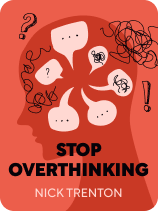

This article is an excerpt from the Shortform book guide to "Stop Overthinking" by Nick Trenton. Shortform has the world's best summaries and analyses of books you should be reading.
Like this article? Sign up for a free trial here.
Are you surrounded by negativity? How can you have positive thoughts?
Overthinking is usually caused by negative reactions to a tense situation. But Stop Overthinking by Nick Trenton says that you can replace these negative thoughts by exhibiting a positive mindset.
Learn how to have positive thoughts by focusing on the three things detailed below.
Develop Positive Beliefs
You need to replace your inaccurate, negative beliefs with positive ones to become more resilient to stress and curb your overthinking. By reframing how you view yourself and the world, positive beliefs strengthen your sense of control and improve your ability to manage stressful challenges productively and effectively.
(Shortform note: Once you’ve replaced your negative beliefs with positive ones, Tony Robbins (Awaken the Giant Within) suggests you reinforce your new positive beliefs with rewards so that you aren’t tempted to revert back to your old negative thinking habits. For example, when you overcome a negative belief with a positive one, give yourself a small reward, such as your favorite snack. When you strengthen your positive beliefs, you’ll find it easier to think of them more automatically and consistently.)
Trenton suggests you focus on three things to learn how to have positive thoughts:
1) Be in the present moment: Focusing on the present promotes a positive worldview because it allows you to find solutions to your problems without stressing about concerns you have no control over. Instead of ruminating on periods of time you have no control over (the past and the future), you direct your attention to the resources you have now.
(Shortform note: Focusing on the present not only helps you curb overthinking but improves your overall happiness in life. In The Power of Now, Eckhart Tolle argues that you can only connect with your true self by being in the present. When you’re connected with your true self, you’re able to silence negative thoughts, which Tolle refers to as your ego, and achieve inner peace and happiness. He suggests one method to focus on the present: Practice being fully immersed in an activity such as walking.)
2) Let go of what you can’t control: Anxiety and overthinking happen when you fixate on things outside of your control. Trenton suggests you focus on what you do have control over. For example, once you’ve signed a lease for an apartment, rather than worry that you’ve chosen the wrong one, focus on ways to increase your happiness with the one you decided on. Research nearby restaurants or parks and make a plan for a smooth moving experience.
(Shortform note: Other experts agree with Trenton on the importance of focusing on what you can control. One way you can do this is by practicing gratitude, which allows you to focus on what you have rather than on what you don’t have. In The Power, Rhonda Byrne argues that practicing gratitude allows you not only to take control of your thoughts but to recognize the control you have to find something to be grateful for in every situation. She advises you to build a habit of appreciating things by intentionally identifying what you love in your daily life and surroundings, such as things you see in nature and the people in your life.)
3) Identify your needs: Rather than worrying about and optimizing every little thing in your life, concentrate on meeting your needs and not your wants. Focusing solely on what you need helps you achieve a more positive mindset by allowing you to let go of unnecessary things that would otherwise drain your time and energy.
(Shortform note: Trenton argues that you should focus on your needs rather than your wants. In 101 Essays That Will Change the Way You Think, Brianna Wiest adds that you should also concentrate on meeting your needs rather than doing what other people expect from you. Like Trenton’s suggestion of letting go of unnecessary concerns, Wiest suggests you stop chasing external validation, such as approval from your friend group and, instead, learn to be more mindful of your own feelings to discover your true needs.)

———End of Preview———
Like what you just read? Read the rest of the world's best book summary and analysis of Nick Trenton's "Stop Overthinking" at Shortform.
Here's what you'll find in our full Stop Overthinking summary:
- What overthinking is and how it’s connected to stress and anxiety
- Ways you can manage stress before, during, and after it happens
- How to conquer your habit of overthinking with long-term solutions






